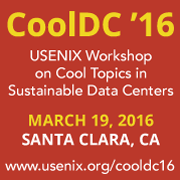help promote

usenix conference policies
Call for Papers
Sponsored by USENIX, the Advanced Computing Systems Association
The USENIX Workshop on Cool Topics in Sustainable Data Centers (CoolDC ’16) will take place on March 19, 2016 directly following NSDI '16 in Santa Clara, CA.
Important Dates
- Paper submissions due: Tuesday, December 22, 2015, 8:59 p.m. PST ***DEADLINE EXTENDED***
- Notification to authors: Tuesday, February 2, 2016
- Final paper files due: Tuesday, March 1, 2016
Workshop Organizers
Program Co-Chairs
Program Committee
Overview
Around the mid-2000s, the advent of mega-scale internet services and public cloud offerings led to a redesign of data center architectures which addressed key inefficiencies, particularly in electrical and mechanical infrastructure. At the same time, accelerated need for efficient servers spurred a generation of research on CPU, memory, network, and storage power management techniques, which have led to a marked improvement in server efficiency and energy proportionality. However, this first generation of improvement has plateaued; further opportunity in the large-scale mechanical infrastructure is limited, and no single server or network component stands out as the key source of inefficiency. Hence, it is time for a second, holistic, clean-slate redesign of the data center, encompassing new server architectures, heterogeneous computing platforms, radical networking paradigms, new mechanical and electrical designs, intelligent cluster management, and radical rethinking of software architectures while considering changing usage patterns (e.g., hybrid private/public clouds).
In addition to developing promising technologies to improve data center efficiency, we also need new metrics to assess the success of SDC research. Currently, power usage effectiveness (PUE) is a widely reported metric to assess the energy efficiency of a data center. The impact of renewables can be assessed via carbon usage effectiveness (CUE) to measure the combined impact of clean energy and energy efficiency on greenhouse gas emissions, and water usage effectiveness (WUE) can be used to assess the water usage of a data center. And yet, all three of these metrics fall short of describing the true efficiency of the data center. They fail to reflect waste at the enclosure/tray level (e.g., VRMs, server fans). Moreover, they do not assess the efficiency or value of the computation being performed and hence fail to reflect server hardware inefficiencies or software bloat.
The 2016 USENIX Workshop on Cool Topics in Sustainable Data Centers (CoolDC '16) is a forum to disseminate results and stimulate further cutting-edge research in quantitative design, evaluation, and research methods for sustainable data centers. The goal of the workshop is to become a venue where experts in sustainable energy systems, data center physical infrastructure, networking and server architecture, cloud computing, and internet-scale applications can come together to exchange ideas on how to maintain and improve the sustainability of warehouse-scale computer infrastructure.
Topics
Topics of interest in sustainable data centers include but are not limited to:
- Instrumentation, measurement, and characterization studies
- Metrics, benchmarks, interfaces
- Performance, energy and other resource trade-offs, energy complexity
- Energy-efficient software optimization, application design
- System-level optimization, cross-layer coordination
- Scheduling, run-time adaptation, feedback control
- Processor, memory, network, storage, hardware components and architecture
- Reliability and power management
- Thermal management
- Green energy sources and their implications
- Technologies for and management of energy storage
- Life-cycle analysis
The workshop seeks submissions of early-stage research and novel ideas that have a high likelihood of generating interesting discussion.
Submission Instructions 
Please submit your papers by 8:59 p.m. PST on December 15, 2015, in PDF format via the Web submission form. Do not email submissions.
Submitted papers must be no longer than 6 single-spaced 8.5" x 11" pages. The complete submission should be typeset in two-column format in 10-point type on 12-point (single-spaced) leading, with the text block being no more than 6.5" wide by 9" deep. Submissions that violate any of these restrictions may not be reviewed. The limits will be interpreted fairly strictly, and no extensions will be given for reformatting. If you wish, you may use our LaTeX templates and style files.
Reviewing will be double-blind; therefore, please do not include any author names on any submitted documents except in the space provided on the submission form. You must also ensure that the metadata included in the PDF does not give away the authors. If you are improving upon your prior work, refer to your prior work in the third person and include a full citation for the work in the bibliography. For example, if you are building on your own prior work in the papers [1, 2, 3], you would say something like: “While prior work did X, Y, and Z [1, 2, 3], this paper additionally does W, and is therefore much better.” Do NOT omit or anonymize references for blind review.
Submissions to CoolDC '16 may not be under consideration for any other venue. Simultaneous submission of the same work to multiple venues, submission of previously published work, or plagiarism constitutes dishonesty or fraud. USENIX, like other scientific and technical conferences and journals, prohibits these practices and may take action against authors who have committed them. See the USENIX Conference Submissions Policy for details.
Questions? Contact your program co-chairs, cooldc16chairs@usenix.org, or the USENIX office, submissionspolicy@usenix.org.
Papers accompanied by nondisclosure agreement forms will not be considered. Accepted submissions will be treated as confidential prior to publication on the CoolDC ’16 Web site; rejected submissions will be permanently treated as confidential.
All papers will be available online to registered attendees before the workshop. If your accepted paper should not be published prior to the event, please notify production@usenix.org. The papers will be available online to everyone beginning on the day of the workshop, March 19, 2016.
connect with us